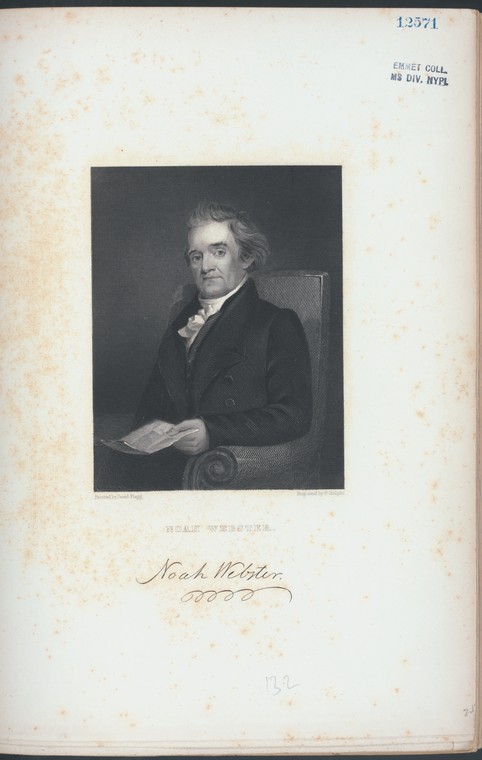Biblio File
A Language of Our Own: America’s English and the Influence of Noah Webster

Webster began his career as a schoolteacher and recognized a need for a quality teaching tool for children learning grammar and spelling. The Revolutionary War had just ended, and Webster also felt there was a need to create a national language in America, a language distinct from that spoken in the former British motherland that they were trying to separate themselves from. Americans were already speaking their own unique "Americanisms," words influenced from Native American and African words and repurposed or revived British English words. Webster wanted to make sure, however, that all Americans were speaking the same words, and spelling them and pronouncing them the same way. This would be the unifying force that would connect a country that already at that time was linguistically and ethnically diverse. He published his grammar books starting in 1783, which included a speller, grammar, and reader.
In 1806 Webster published his first dictionary, the Compendious Dictionary of the English Language, and soon after began plans for a bigger and better version. The American Dictionary of the English Language took years of travel and research, but was finally published in 1828. This volume was twice the size of his last and included Americanisms and Webster's own original definitions for some words. Some of these definitions, including the one for "to immigrate," would come to define not only the word but the concept itself for Americans.
The New York Public Library houses a wealth of Noah Webster material, including a collection of his personal papers as well as many of his own personal copies of books, including Samuel Johnson's dictionary where he took many of his definitions from.
Also check out these books if you are interested in learning more about early American English and Webster's influence:
A is for American : Letters and Other Characters in the Newly United States
by Jill Lepore
The Politics of American English, 1776-1850 by David Simpson
Language and Political Meaning in Revolutionary America by John Howe
Read E-Books with SimplyE
 With your library card, it's easier than ever to choose from more than 300,000 e-books on SimplyE, The New York Public Library's free e-reader app. Gain access to digital resources for all ages, including e-books, audiobooks, databases, and more.
With your library card, it's easier than ever to choose from more than 300,000 e-books on SimplyE, The New York Public Library's free e-reader app. Gain access to digital resources for all ages, including e-books, audiobooks, databases, and more.
If you don’t have an NYPL library card, New York State residents can apply for a digital card online or through SimplyE (available on the App Store or Google Play).
Need more help? Read our guide to using SimplyE.
Comments
Rabecca, Thanks for pointing
Submitted by Thomas Lannon (not verified) on June 21, 2010 - 3:12pm
Thank you Thomas for adding
Submitted by Rabecca McDonald on June 21, 2010 - 5:39pm